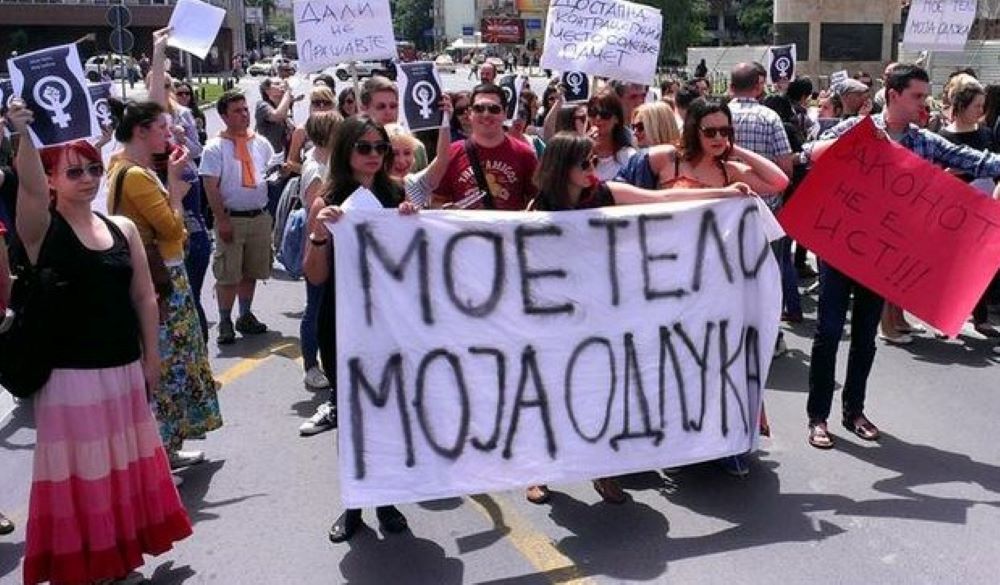If ever the different religious communities have managed to reach a consensus on their views, it has certainly been in the efforts to control the female body.

Bojana Jovanovska
Thanks to its socialist past, the independent Republic of Macedonia inherited legislation that largely reflected the liberal attitude towards abortion. Twenty years after the declaration of independence (1991), with the coming to power of a party that declares itself Christian-Democratic and enjoys serious support from the Macedonian Orthodox Church as the dominant religion in the country, began the subtle intrusion into the rights and freedoms of women for making decisions about one’s own body.
The beginning was followed by an anonymous campaign by distributing print and video materials about the negative consequences of abortion, followed by the introduction of cash benefits for having a third and a fourth child, increasing the cost of abortion, and increasingly frequent media statements of public figures (primarily politicians and clergy). All culminated in 2013 with the submission of a restrictive bill on termination of pregnancy by the Ministry of Health in an abbreviated procedure. Despite the riotous reactions and the protests by many civil society organizations and the general public, whose arguments and views were completely ignored in the preparation of the legal changes, the law was adopted quickly, without public debate and, almost overnight, it made access to abortion significantly more difficult, complicating and bureaucratizing the procedure for termination of pregnancy.
After the change of government in 2017, a new Law on Abortion was adopted in May 2019, which removed some of the administrative obstacles, and the Law provided that abortion could be performed until the end of the 12th week of gestation with written consent of the pregnant woman, while the formation of the First Instance Commission was moved from the 12th to the 22nd gestational week of pregnancy. The law also introduced medical abortion as an alternative method of terminating pregnancy until the ninth week of gestation, but its availability is still limited to the University Clinic for Gynecology and Obstetrics in the capital of Macedonia.
If ever the different religious communities have managed to reach a consensus on their views, it has certainly been in the efforts to control the female body. Thus, this time as well, the adoption of this law was not met with silence by the leaders of the Macedonian Orthodox Church, the Catholic Church, the Evangelical Methodist Church and the Islamic religious community in the country, who found themselves concerned and issued a joint statement that “The proposed legal solution for termination of pregnancy violates the basic right to life of the unborn child and legalizes the conscious taking of an innocent life.” Their omission from the parliamentary debate on the law was presented as discrimination and endangerment of the freedom of belief, thought and public expression of thought, despite the constitutional secularity of the state.
Any space for intertwining religious dogmas with secular laws is dangerous and often abused by conservative parties in order to justify their efforts to interfere in the autonomy of the female body. Any attempt to restrict women’s right to decide on their own bodies perpetuates traditional gender roles, which reduce women to no more than a household appliance. Using religion as an accomplice, but also as an instrument to intimidate citizens, with narratives consisting of various hymns aimed at motherhood, and equating the abortion with infanticide, the taboo of abortion is nurtured and the already silent voices of women are additionally silenced.
Probably the most visible blows to women’s rights are in times of crisis, such as the pandemic and the economic crisis in which we live. This is fertile ground for the development of anti-gender movements, which are increasingly present both globally and in the country. Despite the fact that we currently have “extreme abortion liberalization” in Northern Macedonia, as stated by the head of the Islamic religious community, the fear of overflowing of negative trends that are gaining momentum in the United States, Poland, Hungary, is not unjustified. Despite the wobbliness of conservative positions, based not only on outdated narratives, but also on the evident ignorance of the basics of the functioning of women’s bodies, the threat of changing laws and imposing regressive policies is still prevalent. Hence, vigilance over the defence of human rights becomes more than necessary, because history teaches us that laws are not carved in stone (unlike the religious word) and that the threat to human rights, especially the rights of women, is constantly present.



Leave A Comment